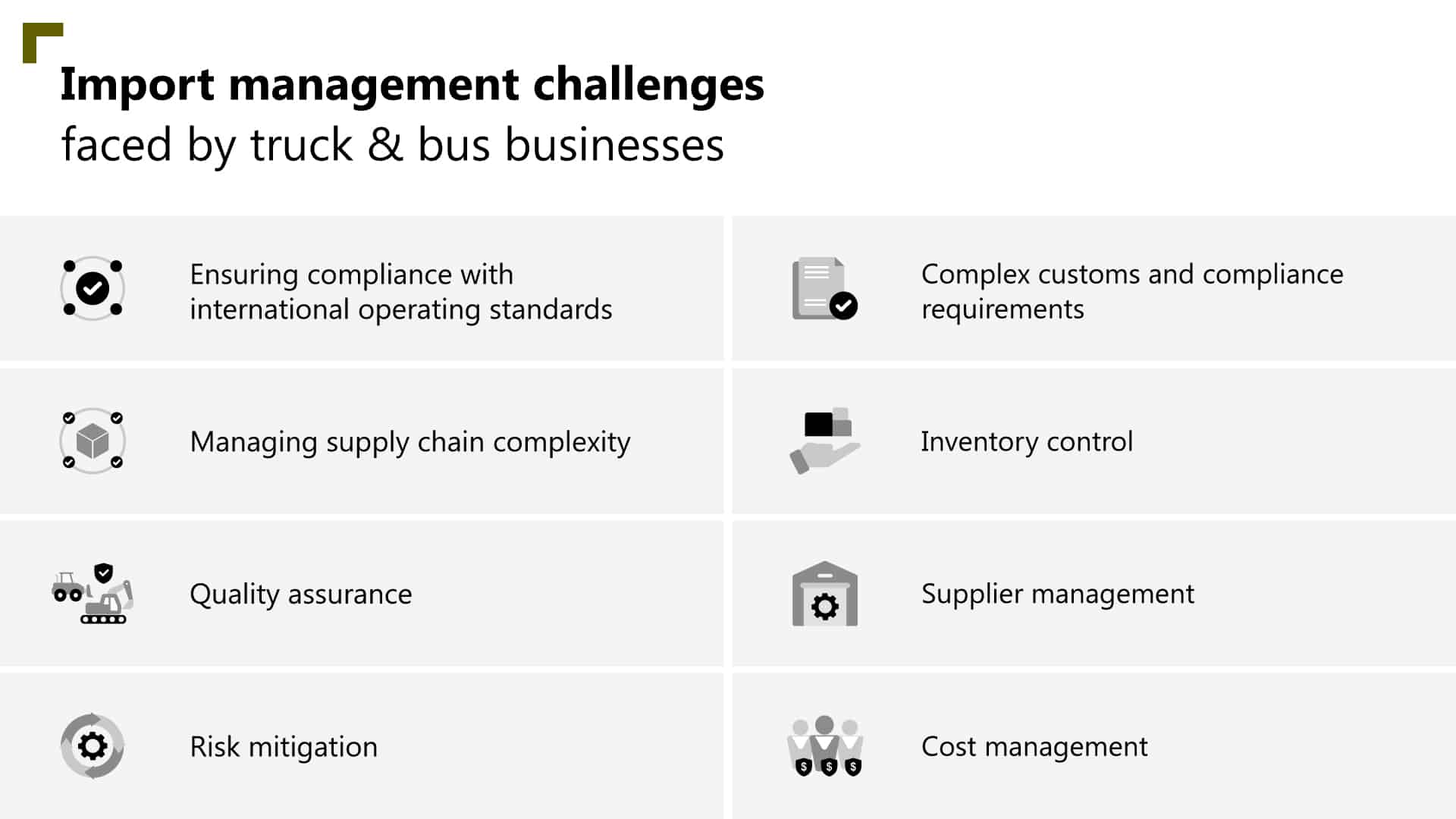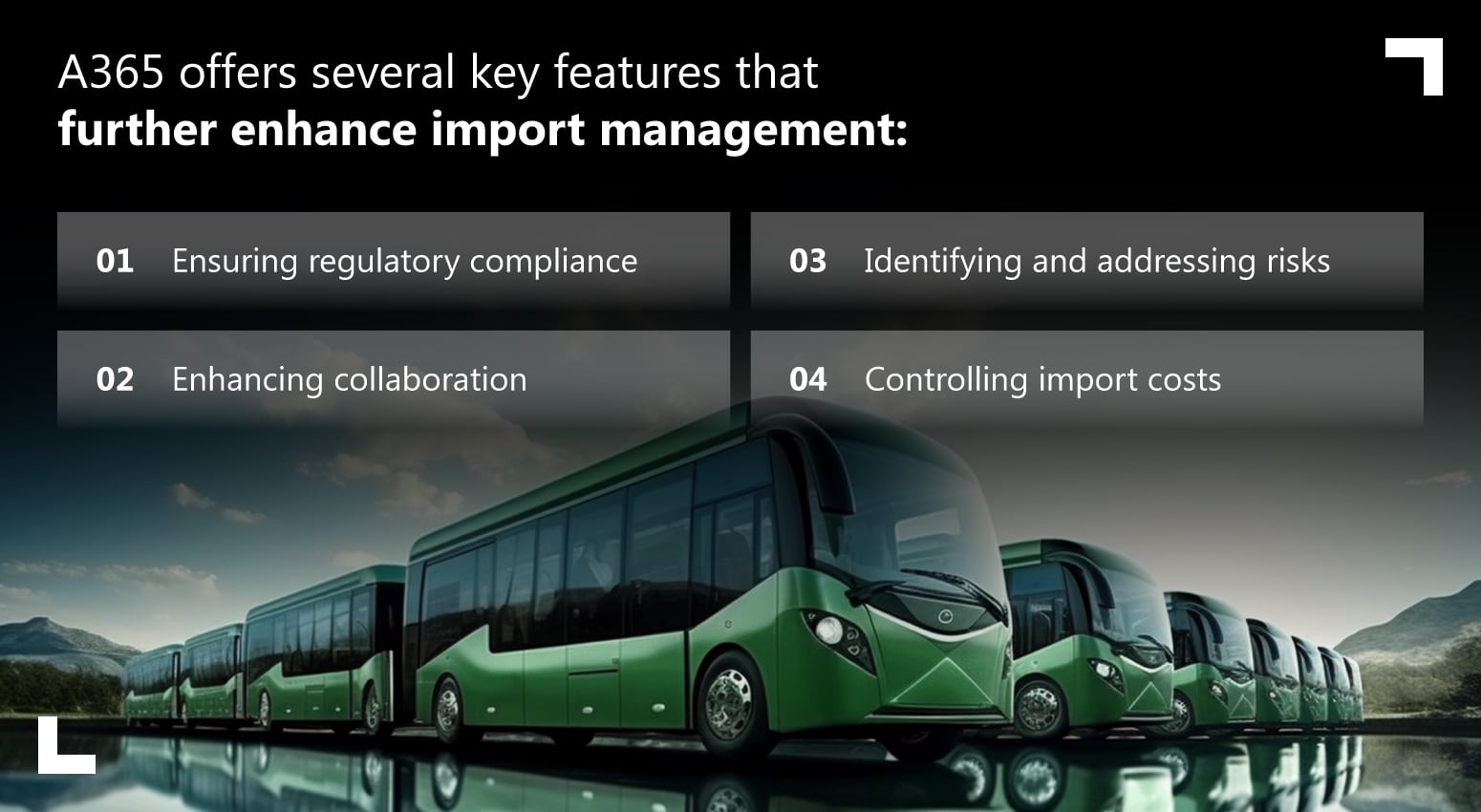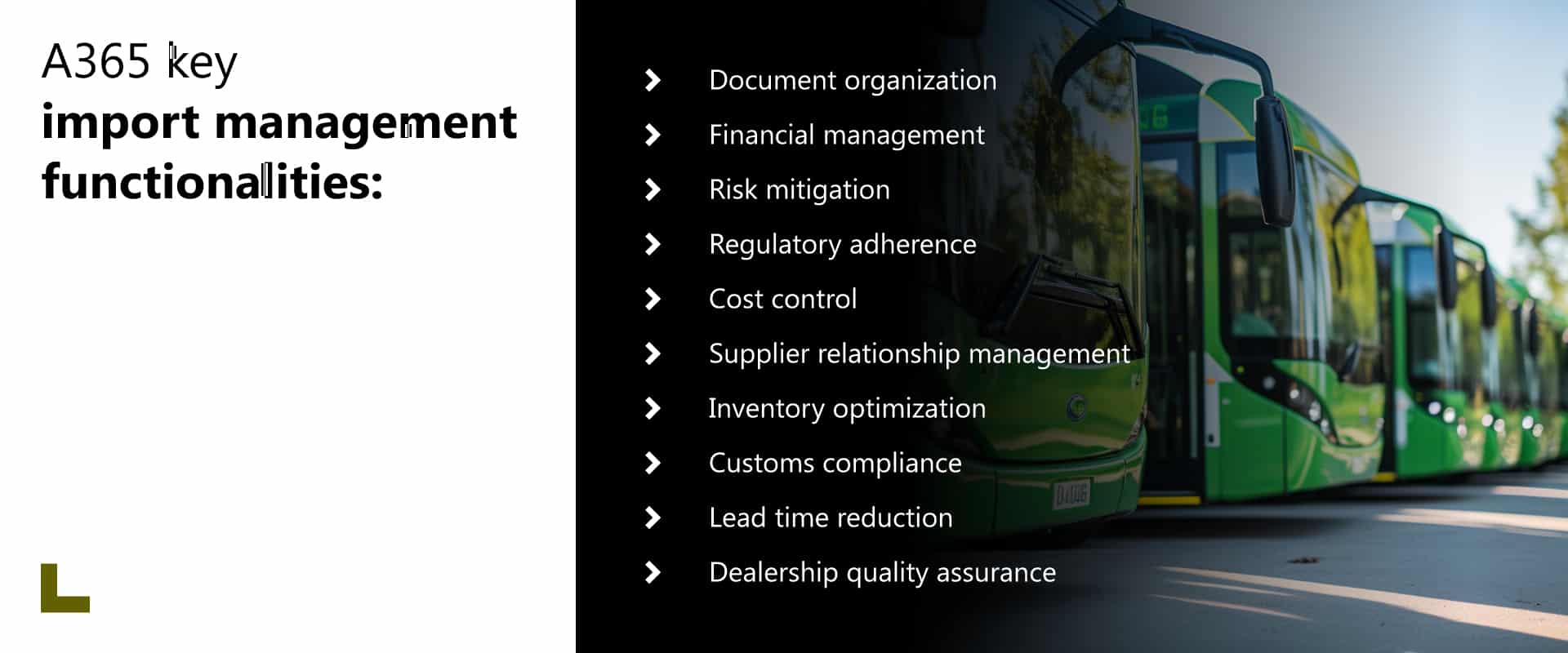The truck and bus industry is vital for global trade, moving goods and people. However, managing imports in this industry can be challenging, affecting efficiency and profits. From dealing with customs and compliance to handling supply chains and ensuring quality, import management needs a thorough approach to succeed.
To tackle these challenges, Annata has developed A365, a robust solution that can modernize all aspects of truck and bus businesses, including import management. A365 offers a comprehensive solution to the various challenges faced by businesses in the import process. A365 empowers businesses to streamline processes, enhance collaboration, and ensure compliance, ultimately leading to increased efficiency, reduced costs, and improved profitability.
Import management challenges faced by truck & bus businesses
Before we delve deeper into A365’s import management capabilities, let’s take a look at some of the challenges that most truck and bus businesses face today when it comes to import management:

Ensuring compliance with international operating standards: Truck and bus businesses must adhere to multiple international regulations and standards when importing vehicles and parts. These standards can vary significantly from country to country, requiring businesses to stay updated with the latest regulations and ensure compliance at all times. Failure to comply can result in costly penalties and delays in the import process.
Complex customs and compliance requirements: Navigating the customs and compliance requirements of different countries can be challenging and time-consuming. Each country has its own set of rules and regulations governing imports, including documentation requirements, tariff codes, and import duties. Businesses must ensure that all necessary paperwork is in order and that they are in compliance with local laws to avoid delays and penalties.
Managing supply chain complexity: The truck and bus industry relies on a complex network of suppliers and manufacturers spread across the globe. Managing this intricate supply chain can be challenging, as businesses must ensure timely delivery of parts and components while maintaining quality standards. Any disruption in the supply chain can lead to delays in production and increased costs.
Inventory control: Maintaining optimal inventory levels is crucial for truck and bus businesses to meet customer demand while minimizing carrying costs. However, managing inventory can be challenging, especially when dealing with imported parts and components. Businesses must strike a balance between stocking enough inventory to meet demand and avoiding excess inventory that can tie up capital.
Quality assurance: Ensuring the quality of imported parts and components is paramount for truck and bus businesses. Any defects or issues with quality can lead to costly recalls and damage to the brand’s reputation. Implementing robust quality assurance processes and working closely with suppliers to maintain quality standards is essential.
Cost management: Importing vehicles and parts can be expensive, with costs including import duties, taxes, transportation, and storage. Managing these costs effectively is crucial for the financial health of truck and bus businesses. Implementing cost-effective strategies, such as consolidating shipments and optimizing inventory levels, can help mitigate import-related costs.
Supplier management: Building and maintaining strong relationships with suppliers is essential for ensuring a smooth import process. Effective communication and collaboration with suppliers can help businesses address issues promptly and avoid delays in the supply chain. Developing a diverse supplier base can also help mitigate risks associated with reliance on a single supplier.
Risk mitigation: Importing vehicles and parts comes with risks, including supply chain disruptions, geopolitical instability, and currency fluctuations. Truck and bus businesses must have robust risk mitigation strategies in place to identify and address potential risks before they escalate into larger issues. This can include diversifying suppliers, implementing contingency plans, and staying informed about global events that may impact the supply chain.
Streamlining import management with A365
Seamless import management from beginning to end is a critical aspect of the truck and bus industry. A365 built on top of Microsoft Dynamics 365, offers a comprehensive solution to streamline this process. A365’s import management feature is designed to address every facet of the import process. Some of the benefits businesses can experience with A365 include:

Comprehensive support: A365 simplifies the import process and ensures compliance with international operating standards. It provides comprehensive support, including organizing import documents and ensuring regulatory compliance, to facilitate smooth and efficient import operations.
Efficient communication: A365 promotes efficient communication between management teams and global partners. By providing a centralized platform for collaboration, A365 helps streamline international collaboration, improving communication and coordination across the supply chain.
Enhanced warranty management: A365 elevates warranty management and maintenance processes, enhancing the value of each imported item. By effectively managing warranties and maintenance schedules, A365 ensures exceptional after-sales experiences for customers, enhancing customer satisfaction and loyalty.
Minimized downtime: A365 is designed to ensure peak operational efficiency, minimizing downtime for import operations. By streamlining processes and improving efficiency, A365 ensures that vehicles are always available when needed, helping businesses maintain high levels of productivity and customer satisfaction.
In addition to these benefits, A365 offers several key features that further enhance import management:

Ensuring regulatory compliance: A365 helps ensure regulatory compliance by organizing import documents and providing visibility into regulatory requirements. This helps businesses avoid compliance issues and maintain a positive reputation.
Enhancing collaboration: A365 facilitates collaboration across the supply chain by providing a centralized platform for communication and document sharing. This improves efficiency and reduces lead times.
Controlling import costs: A365 helps businesses control import costs by providing visibility into financial data and optimizing budget management. This helps businesses mitigate financial risks and improve profitability.
Identifying and addressing risks: A365 helps identify and address potential import-related risks by providing insights into import operations. This helps businesses safeguard operations and minimize disruptions.
A365 key import management functionalities

A365’s import management functionalities go beyond internal processes to address external factors. Here are the key functionalities that help businesses optimize their import operations:
Document organization: A365 organizes import documents systematically, ensuring easy access and retrieval when needed. This feature is particularly beneficial for ensuring compliance with customs and regulatory requirements.
Financial management: The platform helps manage import-related finances, ensuring cost control and effective budget management. By providing visibility into financial data, A365 enables businesses to make informed decisions and optimize their financial resources.
Risk mitigation: A365 identifies and addresses potential import-related risks, safeguarding operations and minimizing disruptions. By analyzing data and providing insights, A365 helps businesses mitigate risks and ensure smooth import operations.
Regulatory adherence: A365 ensures compliance with regulatory requirements, minimizing the risk of penalties and fines. By staying updated with changing regulations, A365 helps businesses avoid compliance issues and maintain a positive reputation.
Cost control: A365 helps in controlling import costs, optimizing budgets, and mitigating financial risks. By providing insights into cost drivers and expenses, A365 enables businesses to identify cost-saving opportunities and improve their bottom line.
Supplier relationship management: A365 facilitates effective communication and collaboration with suppliers, enhancing efficiency and reducing lead times. By streamlining communication processes, A365 helps businesses build strong relationships with suppliers and improve supply chain performance.
Inventory optimization: The platform helps in optimizing inventory levels, ensuring optimal stock levels, and minimizing excess inventory. By analyzing demand patterns and inventory data, A365 helps businesses improve inventory management and reduce carrying costs.
Customs compliance: A365 ensures compliance with customs regulations, facilitating smooth and hassle-free import operations. By automating customs clearance processes and providing real-time updates, A365 helps businesses avoid delays and ensure on-time delivery of imported goods.
Lead time reduction: By streamlining processes and improving efficiencies, A365 helps reduce lead time and increase operational efficiency. By optimizing supply chain processes, A365 helps businesses improve delivery times and meet customer expectations.
Dealership quality assurance: A365 enhances dealership quality assurance processes, ensuring that imported items meet the highest standards of quality. By providing visibility into product quality and performance, A365 helps businesses maintain customer satisfaction and loyalty.
In summary, A365’s import management feature stands as a transformative solution for the truck and bus industry, revolutionizing the way businesses handle import operations. Its ability to address key challenges, such as compliance, communication, warranty management, and downtime reduction, positions A365 as a game-changer in the industry.
With A365, businesses can streamline their import processes, enhance collaboration with global partners, and ensure compliance with international standards. This not only leads to increased efficiency and reduced costs but also improves overall profitability.
As you navigate the complexities of import management in the truck & bus industry, consider leveraging A365 to optimize your operations and stay ahead of the competition. Embrace the future of import management with A365 and unlock new possibilities for your business.
Ready to revolutionize your import management? Contact us today to learn more about how A365 can transform your business.












